Good listening and good talking are equally important and often related, is what we learned from syndicated American radio personality Elvis Duran.
Radiodays Europe’s masterclass with Z100’s morning mayor was full of great nuggets for successful personality radio, from ‘easing’ show prep to acing star interviews. One key is to be personal yourself, and also ask personal questions. “The pre-interview is the most important part.”
“We did the right thing by our listeners”

During election time, stay away from political polarisation (image: 123RF / Carsten Reisinger)
Withhold your political opinions
While Elvis Duran & The Morning Show doesn’t avoid difficult topics (as seen in part 1), they do stay away from political issues, especially during elections. It’s a lesson they learned from the heated 2016 presidential campaign. “All people were doing, was screaming at each other; not listening… I cried on some nights, going to sleep. It was frustrating; heartbreaking to see how people were treating each other because they didn’t agree politically.”
Maintain your neutral position
The fact that Elvis was friends with some members of the Trump family — even if Donald Trump wasn’t among those people and those friendships started way before Trump ran for president — complicated things. “It caused kind of a stir when listeners assumed that I’m supporting Donald Trump in the race, which I didn’t do. I was very careful to not support anyone. We walked down the central line as best as we could.”
Track your audience & images
The negativity between presidential candidates and their supporters made led him to make the show a political-free zone. “I thought: we’re going to have a place where people can go that has no one arguing.” As many people interpret political topics as either supporting or not supporting a candidate (“either way, you lose”), it was decided to stay neutral. “I think we did the right thing by our listeners; ratings stayed up. I didn’t even do research to see if we lost any Republicans or Democrats, I don’t know.”
“Have that one jumpstart; the rest just falls into place”
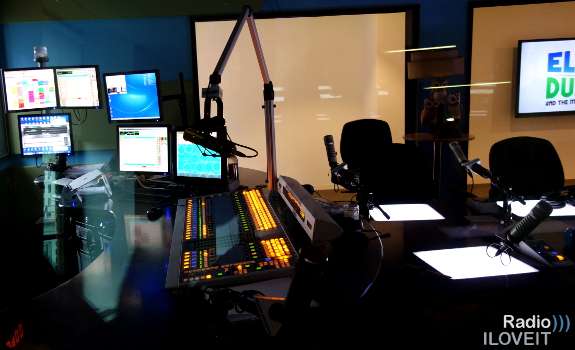
On his morning walk to the Z100 studio in New York’s former AT&T building, Elvis thinks of one opening topic he’s really passionate about (image: Thomas Giger)
Use your personal experiences
Elvis shares that his show prep is actually his and his team’s everyday life. He does not script anything, and allows storylines to develop spontaneously: “My mother used to have a saying: if it crawls across the front yard, we’re gonna’ cook it, and we’re gonna’ eat it — that’s dinner tonight! What I have done to prepare, is have lots of conversations with people who are working in the building. To me, that’s the best prep.” When Dennis Clark came to work on the show, they did prepare a time & topic schedule, but they found that it not always works for Elvis personally:
Determine your launch topic
There is only one thing that he plans in advance. Every morning, he walks a few blocks from his apartment building to Z100’s studios on 6th Avenue, allowing him to think of one kick-off topic. “I’ll just blow through the door — six o’clock, boom, we’re on — and everyone will look at me and go: what the hell is he going to say? It could be [about] someone I met the night before who impressed the hell out of me, or a song I heard. It’s good for a morning show to have that one jumpstart, passionate-feeling moment ready to go, and the rest just falls into place.”
Connect your various storylines
During Elvis Duran & The Morning Show, one topic aspect often leads to a related new topic, who create a string of topics, which together form a storyline. The art is to be a good listener, and just go with the flow:
“I learn so much from the interns”
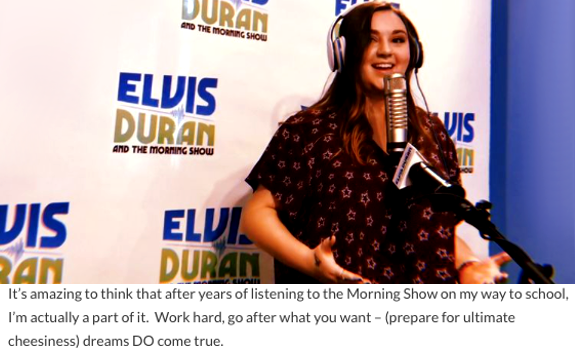
Giving young people a career opportunity also benefits the station & show (image: iHeartMedia)
Appreciate your new talent
Being surrounded by star presenters and successful PD’s may be intimidating for new talents, who often look up to experienced colleagues. Elvis thinks that program directors should actually show respect for young personalities, like the night jock on one of iHeartMedia’s Miami brands. “They think of him as a kid, [but] they should be listening to him, because I’ve seen him interact. We’ve had a fundraiser for the high school in Parkland, Florida, where the shooting was. I’ve watched him work this crowd… he’s one of them! I didn’t know how to do that. I’m 53 years old!”
Keep your ears open
His advice for programmers is to be open-minded, and listen to new talent such as the night host of the Miami station. “As nervous as he may be around the BS of the business, he’s got something going on that we don’t. Letting [them] know: ‘Hey — I’m listening to you, what is it that we’re missing here?’, making them part of the discussion, is going to breathe enthusiasm and fire into them. Let them be a part of it, not just someone who’s new and learning.”
Offer your talent traineeships
It’s one of the reasons why he loves their intern program, led by executive producer David Brody. “We bring in 6 college students every semester, and make them part of the show. I know what they’re doing in their dating lives, and what’s it like at school or university. Listening to them is so important for us. I learn so much from the interns, and I give them the license to tell me off; tell me I’m stupid; I’m really missing the point. I love that.”
“We’re pulling 250,000 people in a listen”
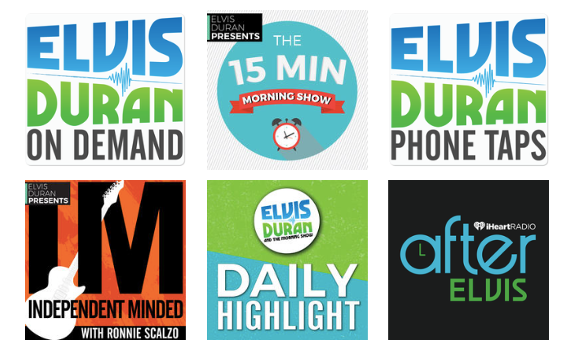
The morning show’s news podcast is a very popular title for them (image: iHeartMedia)
Balance your modern technology
Talking about radio’s role in this time of giving commands to smart speakers with instant gratification via on-demand audio, Elvis Duran feels like personal connection through live radio is needed more than ever. “We are living in a society where we can hear a song by saying: ‘Hey — play a song’ without even saying: ‘please’. Technology is fantastic, and I love having the ability for people to find us in different; unique; fresh ways. At the same time, I still have to deliver this one-on-one communication. We have to be so against letting that slip away.”
Narrow your podcasting themes
He sees podcasting as a great extension of broadcast radio, as you can talk about one specific topic, instead of many different subjects like you would do in a show. In addition, a podcast can get a certain part of your audience (that is interested in your narrow topic) to know you better, which may make them listen to your on-air show differently:
Expand your podcast portfolio
Elvis Duran & The Morning Show is publishing over a dozen titles now. “Everyone on the show gets a podcast — people [of which] I didn’t even know [that they] work for me have a podcast!” Seems like it can be worthwhile for stations and shows to invest some time and resources in podcasting: “One of our news podcasts is doing fairly well; we’re pulling 250,000 people in a listen. In the podcasting world, there are some that pull millions and millions, but it’s our little ‘baby’ podcast, so bringing in a quarter of a million people — that’s pretty cool!”
“Let me be me; let me do my thing”
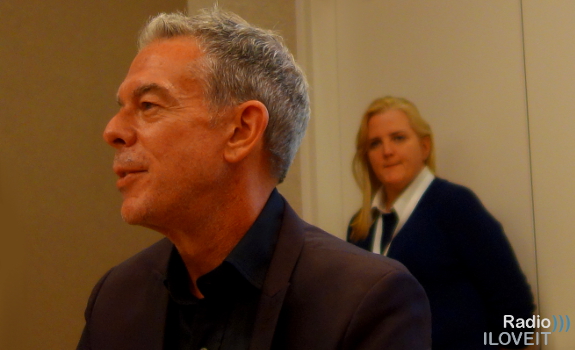
Elvis Duran is more on the creative side than on the format side of radio (image: Thomas Giger)
Control your ratings game
I was interested in Elvis’ approach to the classic tension of ‘science versus art’ — ‘creativity versus format’ — that we know in radio. Many US rogram directors seem to be obsessed with PPM; in-the-moment measurement of what you do on air. How does he, as a creative, deal with radio laws like pre-selling that can help to increase Time Spent Listening as well as increase tune-in occasions? “I fail at those. I’m great at just putting it out there, and just hope it fits into the bottle.”
Run your internal clock
He does monitor and balance the content flow really consciously, though. “I can remember: ‘Yesterday morning [around] 7.15, were we laughing or were we serious? We were serious; I should laugh today’. I have this weird spectrum in my head; I’m constantly tracking my show. I do know that we need to talk ‘here’ and ‘there’ to make the PPM box know we’re there. That’s as close to the science as I get. If I paid more attention to it, we would have higher ratings, I guess…” See Premiere Networks’ syndication format for Elvis Duran & The Morning Show.
Follow your inner guide
While he feels like a separation between the science and art of radio can be good, he also sees the beauty of combining them. “Do I need to be shutting up at a quarter past the hour, and if that means I get a bigger bonus check at the end of the year? They’ll have to dangle it like a carrot”, he jokes, realising he’s is definitely on the artistic side. “I truly believe in ‘gut’. I’m from that school of ‘just let me be me; let me do my thing; trust me; it’s gonna’ work’, and they case me with these computers and charts; I don’t know how to read them.”
“When we play a song, it will get a reason for being there”
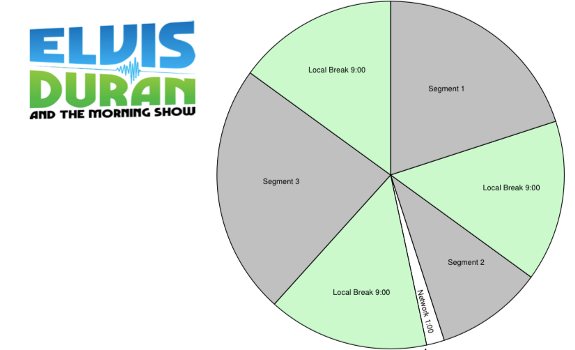
Elvis Duran & The Morning Show’s has relatively long and mainly talk-based content segments, like in this syndicated version’s hour 1: click to enlarge (image: Premiere Networks)
Balance your compliments & critique
When I ask Elvis if he and Z100 PD Mark Medina talk a lot about the show, he indicates that they have a professional relation built on personal trust and constructive comments. “He’ll have a fantastic way of [saying] ‘This morning, I thought it was so funny when you said ‘bla-bla-bla-bla’, but I was a little curious why you followed it up by saying ‘this’. It didn’t resonate with me, but after that, you were great!’ And I say: ‘Mark, you just fed me a shit sandwich’, hahaha. He’s great. We have a great relationship.”
Support your program director
Elvis Duran has seen radio from a program director’s perspective as well, programming WIOQ Philadelphia, Pennsylvania and KBTS (now KGSR) Austin, Texas during the late 1980s and early ‘90s. “A good PD is someone who can manage ‘above’ and keep me; ‘below’, safe. A PD is management; you’ve got to deal with numbers; budgets; bankruptcies… A good PD is someone who’s your friend, someone you would hang with, even if you would not work with him or her.” From the side he’s on today, he thinks that on-air talent should be open for feedback from others.
Make your producer responsible
One of his challenges with radio rules like ‘hook & tease’ is that Elvis Duran & The Morning Show is so dynamic in terms of content. Their speech segments are pretty long, while their discussion topics are constantly evolving. So even if they would let someone keep an eye on content and structure, planning & promoting stuff ahead isn’t always easy:
“She can’t be ‘Taylor Swift, The Super Star’”
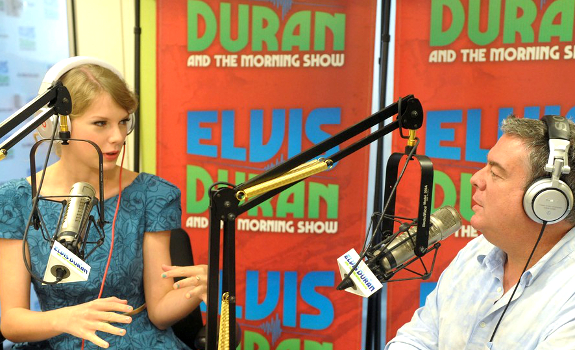
To get high-quality answers from super stars, use a very personal approach (image: iHeartMedia)
Have your ‘backup topics’
He thinks they could still be better at determining when a topic has reached its peak; when it is time to move on, but he does have an exit strategy for dead ends. “I do have a few things ready to go to when I feel like it’s totally failing.” That risk increased with today’s long speech segments, as they gradually dropped songs from the format clock over time, now leaving them about 2 or 3 titles an hour. The benefit is being more connected to those tracks than before: “I’m into the artist now more than ever, so when we play a song, it will get a reason for being there.”
Increase your social interactivity
Elvis Duran sees social media as a good read of people’s feelings, even if they can be either very positive or extremely negative. “You can use that as your launch point in how you do your show”. Instead of being afraid of new technology, he’s rather embracing it as another tool to be found. “Hello, Alexa — turn on Elvis Duran on Z100. Shit… thank you, little speaker! In five years from now, we’ll be laughing at how we’re today thinking it’s a big deal. I remember they told us what ‘dot com’ meant…”
Make your personalities visible
Instagram is one of the main social media channels for Elvis Duran & The Morning Show, as pictures help the audience knowing your station, your show and yourself. “Twitter is more of a ‘here’s my opinion, and I’m not gonna’ show you how I look like’ — a lot of people hide on Twitter”. While noticing “a feeling in the US that Facebook has lost its lustre” as it’s not something new anymore, he says that they still have a “huge audience” (almost 756,000 Likes at the publishing date of this post) on the blue giant, a reason for him to keep being present there.
“Just because you have Ed Sheeran in there, doesn’t mean your listeners all love Ed Sheeran”

One of Elvis’ goals with star interviews is making celebrities very human (image: iHeartMedia)
Be your best host
From interviewing many celebrities, Elvis has learned how to have a good conversation with media-savvy, A-list personalities who may have a PR agenda. First and foremost, put your guest at ease: “Make them relaxed. Taylor Swift has to be ‘Taylor’ in the chair; she can’t be ‘Taylor Swift, The Super Star’. I’ve got to make her feel comfortable; that is the key. As soon as they arrive, I’ll go in, sit down and go: ‘hey — what did you do last night?’. I don’t talk about music; I don’t talk about anything they’re there to promote.”
Pre-interview your guests personally
It becomes clear that many famous people want to be treated normally. “They want to be talked to like people; they truly do. The pre-interview, to me, is the most important part of the interview.” The pre-conversation includes some personal questions through which he will get to know them better: “What did you do last night? What are you listening to? Who you’re hanging out with? Who’s your new best friend? Who are you trusting? Just in conversation, so by the time you get them in the room, they’re your friend already, and they’re ready to go.”
Make your interviewees likeable
What you do with a celebrity interview matters more than having one: “Just because you have Ed Sheeran in there, doesn’t mean your listeners all love Ed Sheeran. Make them all find something that they all love about him.” Elvis always finds it a compliment when listeners write that they got to like someone only after he or she was a guest on the show. It means that they got to know the interviewee better, so it it was a good conversation. He admits that he once saw interviews as an interruption of the show’s momentum, but that he loves them now.
“Making people look at themselves”
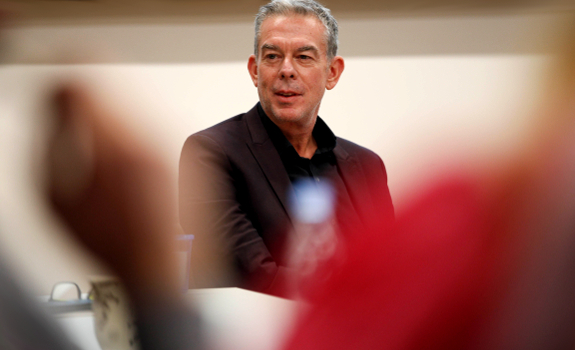
Elvis Duran feels like that’s one of the things a good radio show does (image: Conor McCabe)
Keep your conversation engaging
To get people out of their media training (or media shyness) mode, you can ask them something unexpected. “Sometimes, it has nothing to do with what they were to talk about. You’ll talk about their album; about their tickets; you’ll get to that, but treat them like people.” Same with people who call in to win a prize. “Throw ‘em a curve ball.” He feels like they are not getting the same amount of quality phone calls as they used to, partly because people have less time; they find texting more convenient. There are many more ways to interact with a station today.
Find your guest’s story
What he likes about interviewing people is that everyone has a book inside of them, even if they might not realise it themselves. In his experience, a key to unlocking great stories and ‘forgotten’ memories is to ask open questions that take people back in time: “‘What did you do when you were 15? What was your first job?’ It makes you remember things that you have totally locked up in the back room somewhere.” We can use this concept on air when interviewing studio guests or phone callers: “Making people look at themselves is part of what we need to be doing.”
Header image: Conor McCabe

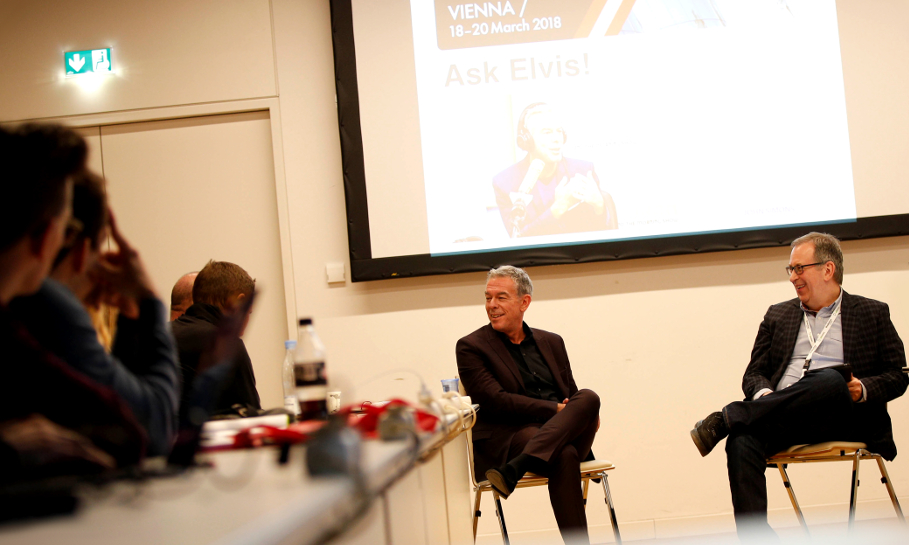
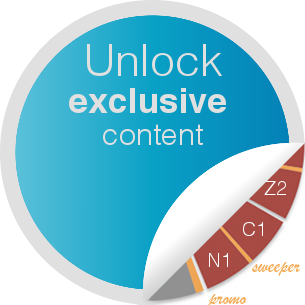

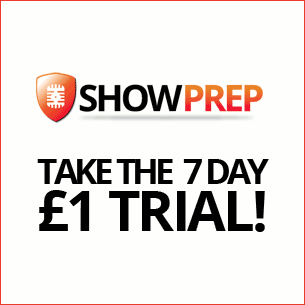
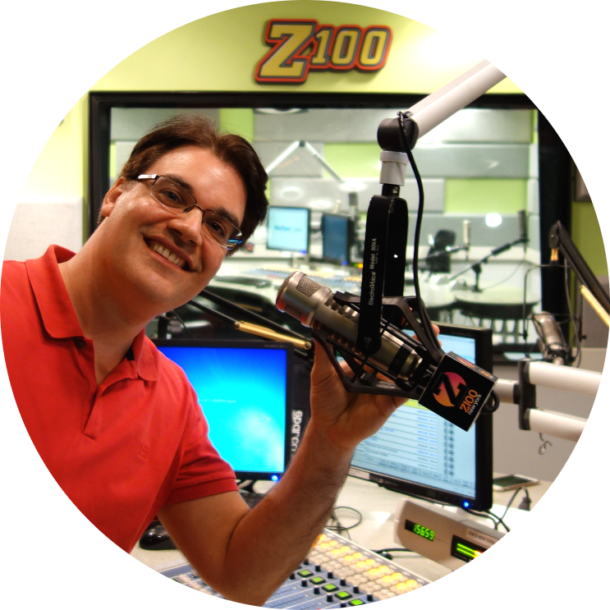
Pleasure, Nina! Thank you for your nice comment. Glad you enjoyed the read & listen!
Very cool reading and listening, thank you Thomas!